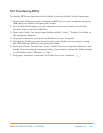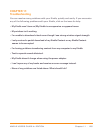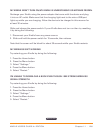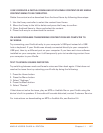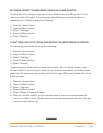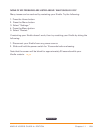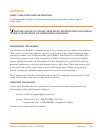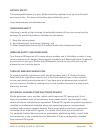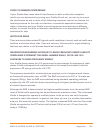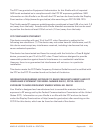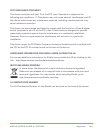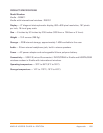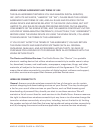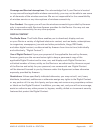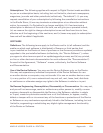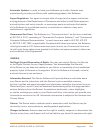
Appendix · 132KINDLE USER’S GUIDE 4
th
EDITION
STEPS TO MINIMIZE INTERFERENCE
If your Kindle does cause harmful interference to radio or television reception
(which you can determine by turning your Kindle off and on), you can try to correct
the interference by one or more of the following measures: reorient or relocate the
receiving antenna for the radio or television; increase the separation between the
radio or television and your Kindle; connect equipment and receivers to different
outlets; or consult the radio or television manufacturer or an experienced radio/TV
technician for help.
WATCH FOR SIGNS
There are some places where RF signals could constitute a hazard, such as health care
facilities, and construction sites. If you are not sure, look around for signs indicating
that two-way radios or cell phones should be turned off.
INFORMATION REGARDING EXPOSURE TO RADIO FREQUENCY ENERGY AND FCC
COMPLIANCE STATEMENT FOR MODEL NUMBER D00501, FCC ID: WI5-1210
EXPOSURE TO RADIO FREQUENCY ENERGY
Your Kindle device meets the U.S. government’s requirements for exposure to radio
waves. Kindle is designed and manufactured not to exceed the emission limits for
exposure to RF energy set by the U.S. FCC.
The exposure standard for wireless devices employs a unit of measurement known
as the specific absorption rate, or SAR. The SAR limit set by the FCC is 1.6 watts per
kilogram (W/kg). Tests for SAR are conducted using standard operating positions
accepted by the FCC with the device transmitting at its highest certified power level in
all tested frequency bands.
Although the SAR is determined at the highest certified power level, the actual SAR
level of Kindle while operating can be well below the maximum value. This is because
Kindle is designed to operate at multiple power levels so as to use only the power
required to reach the network. In general, the closer you are to a wireless base-station
antenna, the lower the power output. The highest measured SAR value for this model
Kindle as reported to the FCC when held at least 0.39 of an inch (1.0 cm) from the
body is 1.32W/kg.



